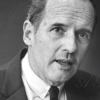Carroll Quigley

Carroll Quigley
Carroll Quigleywas an American historian and theorist of the evolution of civilizations. He is noted for his teaching work as a professor at Georgetown University, for his academic publications, and for his research on the Round Table movement...
NationalityAmerican
ProfessionWriter
Date of Birth9 November 1910
CountryUnited States of America
years two people
For years I have told my students that I been trying to train executives rather than clerks. The distinction between the two is parallel to the distinction previously made between understanding and knowledge. It is a mighty low executive who cannot hire several people with command of more knowledge than he has himself.
light people shining
There were people who said the Society of Cincinnati in the American revolution, of which George Washington was one of the shining lights, was a branch of the Illuminati.
bankers business faster increased loans money result volume
The bankers made loans to business so that the volume of money increased faster than the increase in goods. The result was inflation.
control countries country money recent single subject supply
The supply of money in a single country was subject to no centralized, responsible control in most countries over recent centuries.
ability decisions influence opinion
More important than the Milner Group's ability to influence opinion in the Dominions was its ability to influence decisions in London.
against anyone common germany might occurred position russia
It never occurred to anyone in a responsible position that Germany and Russia might make common cause, even temporarily, against the West.
absence evil negative point presence sin western
In this Western point of view, evil and sin were negative qualities; they arose from the absence of good, not from the presence of evil.
civilization firsts complicated
A civilization is complicated, in the first place, because it is dynamic; that is, it is constantly changing in the passage of time, until it has perished.
leaving might empires
It is also in theory, conceivable that some universal empire some day might cover the whole globe, leaving no external "barbarians" to serve as invaders.
outsiders groups members
A society is a group whose members have more relationships with one another then they do with outsiders.
organization political separation
Our political organization, based as it is on an eighteenth-century separation of powers and on a nineteenth-century nationalist state, is generally recognized to be semiobselete.
religious political intellectual
The backwardness of our religious and social developments is undoubtedly holding back the development of the intellectual and political levels.
actors process irrational
When we approach history, we are dealing with a conglomeration of irrational continua. Those who deal with history by nonrational processes are the ones who make history, the actors in it.
being-free groups behavior
The social sciences are usually concerned with groups of persons rather than individual persons. The behavior of individuals, being free, is unpredictable.